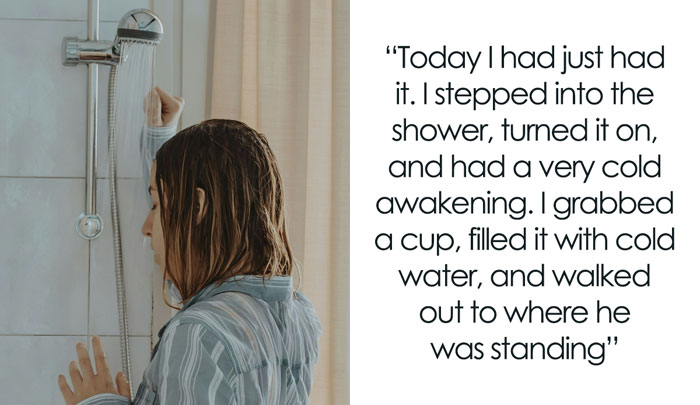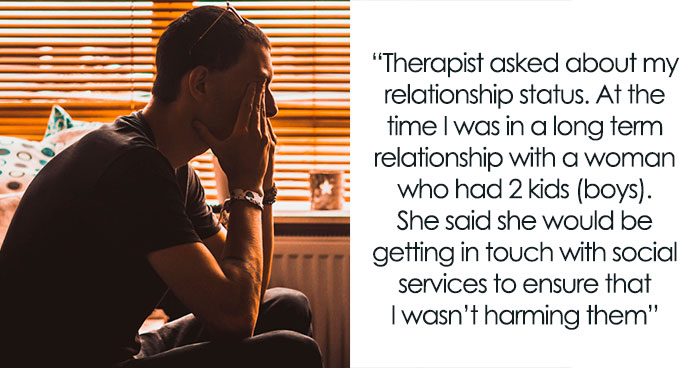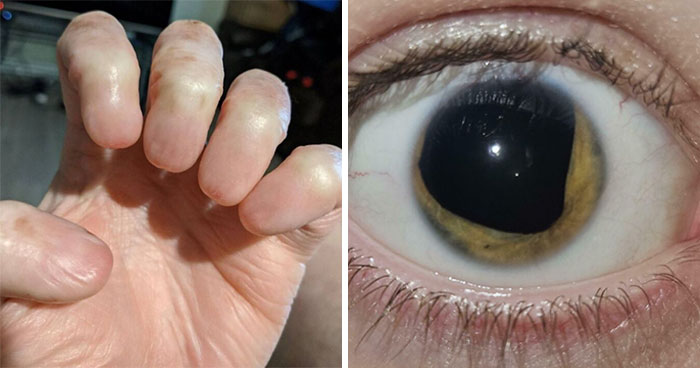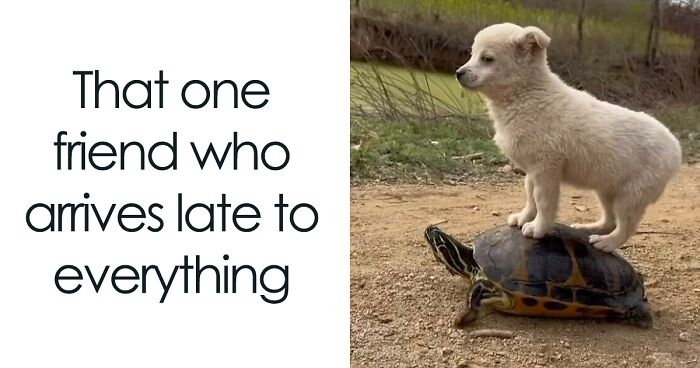
29 Small Signs That Give Away That Someone’s Childhood Might Have Not Been All Rainbows And Ponies
People like to say that childhood is the most wonderful time of our lives. When everything around us is perceived with joy, when every day, even the darkest one, is filled with light. When we are surrounded only by happy faces, and any sadness is only short-lived. But, alas, childhood is also the period when we're most vulnerable to various toxic people.
In fact, it's quite easy to offend a child, and many adults really take advantage of this - and then, growing up, yesterday's kids are left alone with all the consequences of their childhood traumas, which insightful people can rather easily see and recognize.
More info: Reddit
This post may include affiliate links.

 Feeling suspicious or obligated when someone does something nice.
Feeling suspicious or obligated when someone does something nice.
When things are ok, or even more intensely good, there is a feeling of impending doom and waiting for the other shoe to drop.
 Always being positive and happy. Now I know some people are naturally wired to be upbeat but some of us weren't allowed to express any negative emotions. If you're sad, you're ungrateful. If you're angry, you don't have the right to be. If you're depressed, you're making mommy feel bad. So we learned to turn off anything that might indicate there were a major problems at home. Gotta keep up appearances. Meanwhile, you lose the ability to feel anything at all.
Always being positive and happy. Now I know some people are naturally wired to be upbeat but some of us weren't allowed to express any negative emotions. If you're sad, you're ungrateful. If you're angry, you don't have the right to be. If you're depressed, you're making mommy feel bad. So we learned to turn off anything that might indicate there were a major problems at home. Gotta keep up appearances. Meanwhile, you lose the ability to feel anything at all.
Yes. Toxic positivity is real and so terrible for kids. I still seek validation more than I should because I never got any growing up. Every negative emotion was invalid / unacceptable.
 Number 1 is definitely apologizing for everything all of the time. Other stuff includes inability to maintain eye contact, failing to voice a stance on something, even if they know they're right, social anxiety, Depression, self-isolation, etc.
Number 1 is definitely apologizing for everything all of the time. Other stuff includes inability to maintain eye contact, failing to voice a stance on something, even if they know they're right, social anxiety, Depression, self-isolation, etc.
There are many threads on the Internet, the authors of which ask netizens similar questions. For example, "What are the 'I had a toxic childhood' signs people show later in adulthood?" or "What is a small sign that someone had a difficult childhood?" - and every time, there are several thousand people actively participating in the discussions, coming up with their own ideas.
This selection, made for you by Bored Panda, is based on several similar threads from different years, but it is based on one fundamental principle - there are many things that can remind adults of their difficult childhood, and they are not always recognizable at first glance.
 Not knowing how to be comforting towards upset people or accept any comforting gestures from others. Good intention don't make up for the general emotional cluelessness.
Not knowing how to be comforting towards upset people or accept any comforting gestures from others. Good intention don't make up for the general emotional cluelessness.
Oh yeah. I'm very empathetic and caring in general, I like taking care of people, but when someone cries in front of me I feel totally lost as to what I should do and sooo uncomfortable.
 As one who grew up in one, it is serious self-doubt. Never thinking I can do anything right or even doing anything at all.
As one who grew up in one, it is serious self-doubt. Never thinking I can do anything right or even doing anything at all.
Growing up, my mom never thought anyone could do anything right except her and I mean anything in that sense. If she asked you to get her a cutlery and rinse it before bringing, she would go back and rinse it herself, with the excuse that you missed a spot. It was really that bad. Even as an adult, I still get told I didn't do something well even though others have praised my ability to do that thing. I never used to do anything unless I absolutely have to cos I felt I wasn't good at anything or I won't do it well. Although I have started working on it, i still have my bad days.
One thing that has really helped is doing things without telling her. Imagine applying for a job and even before you go for the interview you are already being asked if you can cope with a job?? I just do my things and tell her afterwards. This has really helped me in some weird way.
 My friend is a victim of this and what I’ve noticed is that he never tells anyone if he is in serious danger. A few weeks ago he was at major risk of COVID and we weren’t sure if he had it or not. He didn’t tell anybody until after he was cleared. (Results came back negative though)
My friend is a victim of this and what I’ve noticed is that he never tells anyone if he is in serious danger. A few weeks ago he was at major risk of COVID and we weren’t sure if he had it or not. He didn’t tell anybody until after he was cleared. (Results came back negative though)
He also doesn’t know how to accept gifts. It’s like he’s never gotten one before. He just kinda stares at it awkwardly and says “thanks.” And then feels obliged to get you something too. Like I know he appreciates it but I just think it’s unfamiliar territory for him.
luckily I don't have this problem, since no one has given me a gift. I can't even remember when was the last time someone gave me something for free, or without expecting something in return. People just don't go around giving things to other people
I want to make an important caveat right away - parenting styles differ greatly from generation to generation, and what half a century ago was considered almost an indulgence of children's whims, today can be perceived as toxic parenting and near cruelty. In fact, attitudes towards raising kids have changed a lot over the past two centuries or so.
If in the second half of the 19th century, children were often perceived more as "little adults," with all the ensuing consequences, today many adults are trying to stretch out their childhood as long as possible. Simply because on the way to today's reverent attitude towards kids and childhood, humanity has overcome many barriers and made many mistakes.
 I can't really speak for anyone else, only myself. But here are my definite signs that I've picked up, that normal people don't seem to have:
I can't really speak for anyone else, only myself. But here are my definite signs that I've picked up, that normal people don't seem to have:
* being terrified when people start actually arguing and yelling in front of you, even if it has nothing to do with you
* inability to cry or react "normally" to sad or f****d up things
* people-pleasing (even if you are internally about to lose your s**t over how ridiculous the requests are, just compulsively people-pleasing)
* obsessively giving 110% at work or when giving gifts because the attention feels like a d**g
* eating disorder related s**t. For me, it's binge eating, doing body-checks in the mirror anytime I can, and comparing my body to everyone else's all the time.
* making jokes at bad times. I have to laugh. If I'm not laughing I'm going to cry and crying is bad.
 Hiding things that you don't need to hide.
Hiding things that you don't need to hide.
My ex had a traumatic childhood. He would sneak food from the fridge when we first got together as if I would scold him for being hungry.
If he broke something his first response was to hide it. This took a ton of work, but by the time we broke up he was a lot more calm and comfortable as himself and being around other people.
 Fear of maintaining relationships... occasionally dropping off the face of the planet when friends you really care about start getting too close.
Fear of maintaining relationships... occasionally dropping off the face of the planet when friends you really care about start getting too close.
I did this in relationships for years. Well into my marriage and I was still self sabotaging and expecting my husband to leave at any moment, pretty much challenging him to do it. I'd always keep him at a distance preparing for it to end. It wasn't until almost 10 years in when I realized he actually cared enough to talk about things and work through them. And let's not even get into friendships, I'm terrible at keeping friends. I had a large friend group at one point, but my lack of vulnerability eventually pushed them all away 🤷🏽♀️
Well, yet, even though in many countries today the principles of gentle parenting seem to have finally prevailed among the majority of parents (at least in theory), no one is immune to a toxic atmosphere at home. Living in such an atmosphere, of course, cannot help but leave its mark on kids. So they, having created their own family later, sometimes unconsciously transfer these behavior patterns to their kids.
"Some people, only after coming of age, realize how toxic the atmosphere in the family where they grew up really was. Having realized this, some of them go to therapy to get rid of the consequences of almost inevitable psychological trauma," says Irina Matveeva, a psychologist and certified NLP specialist, whom Bored Panda asked for a comment here. "However, not everyone actually does this."
 Having panic/anxiety attacks every time you get criticized for something at work. I used to get yelled at for every little thing when I was a kid and now if I get yelled at/criticized I automatically burst into tears, I can't help it. The last time my boss seriously criticized me for something that I did wrong and I burst into tears, he told me that he wasn't even scolding me, he was just trying to teach me a lesson and asked why I was reacting so negatively.
Having panic/anxiety attacks every time you get criticized for something at work. I used to get yelled at for every little thing when I was a kid and now if I get yelled at/criticized I automatically burst into tears, I can't help it. The last time my boss seriously criticized me for something that I did wrong and I burst into tears, he told me that he wasn't even scolding me, he was just trying to teach me a lesson and asked why I was reacting so negatively.
Yeah I’m severely sensitive to perceived criticism or rejection, nevermind actual criticism or rejection. Working on it
Oh god me too. I'm getting a little better with age at controlling the tears until I can hide.
Load More Replies...If I unwittingly do something wrong it's fine if someone calmly asks me not to do it again/stop doing it. But if they do it in a way that sounds like condemnation or otherwise come off as harsh, I can't handle it. It triggers me off every single time without fail and I have to go somewhere to cry until I calm down.
 My husband's parents weren't the best. I've been trying to help him work through the "permission asking" for the last 8 years. He's getting better but he would ask permission for things that he should just be able to do. "Am I allowed to put carrots on the grocery list?" Mostly it was with food we had. He always asked permission before eating any of the snacks we had and it took a long time to convince him that it was just the food and we live together, just eat it.
My husband's parents weren't the best. I've been trying to help him work through the "permission asking" for the last 8 years. He's getting better but he would ask permission for things that he should just be able to do. "Am I allowed to put carrots on the grocery list?" Mostly it was with food we had. He always asked permission before eating any of the snacks we had and it took a long time to convince him that it was just the food and we live together, just eat it.
"In fact, in many cases, only qualified help from a skilled specialist can really help a person recover from the destructive patterns embedded in them, to work through childhood traumas. Otherwise, the situation will simply reproduce itself, and toxic behavior in the family and in communication will inevitably form a kind of vicious circle," Irina Matveeva sums up.
The statistics, alas, are merciless. Thus, data from the National Children's Alliance says that an estimated 558,899 children (unique incidents) were victims of violence and neglect in the U.S. in 2022, the most recent year for which there is national data. That's actually eight children out of every thousand. To top it all off, these are data on the most egregious cases.
So, how many situations, alas, will never see the light of day, remaining only in the darkest corners of our souls? God only knows...
 A really odd one I noticed with one of my friends was giving everything away or not accepting things. They'd always say "oh I don't deserve this" or if I looked at something they had and went "Oh that's cool" they always offered it, saying "oh you'd probably get more use from it" no matter what. He told me he never really cared what he got because it was always taken by his family so he didn't mind having nothing. Noticed the same behaviour with a few friends and I, but couldn't understand if it the same reason or something else.
A really odd one I noticed with one of my friends was giving everything away or not accepting things. They'd always say "oh I don't deserve this" or if I looked at something they had and went "Oh that's cool" they always offered it, saying "oh you'd probably get more use from it" no matter what. He told me he never really cared what he got because it was always taken by his family so he didn't mind having nothing. Noticed the same behaviour with a few friends and I, but couldn't understand if it the same reason or something else.
 PTSD. Personal experience and actually diagnosed.
PTSD. Personal experience and actually diagnosed.
I saw a couple in the supermarket buying a gallon of Neapolitan ice cream (chocolate, vanilla, strawberry). I am 42 f*****g years old and started crying in the middle of a Wal-mart about ice cream.
I had a flashback to all the times my mother bitched me out for only eating the chocolate side, but I was deathly allergic to Strawberry. She always bought it and always punished me for not eating it.
 Personally, the biggest leftover symptoms I show are: I hate being touched beyond a handshake, mistrust any attempt at help that I did not at first ask for, and as someone else on this post stated I apologize for everything all of the time.
Personally, the biggest leftover symptoms I show are: I hate being touched beyond a handshake, mistrust any attempt at help that I did not at first ask for, and as someone else on this post stated I apologize for everything all of the time.
So today, please feel free to read this list to the very end, and try to read every tale here thoroughly - and perhaps share your own stories in case you, alas, also have something to say. After all, the more we talk about it, the more likely it is that such bad situations will happen less often. At least, we do hope so.
 For me its not being a bother to anyone, I was told constantly I was a nuisance as a child, I was the last of four, very big gap between my siblings and me so much I barely know them, I know my dad wasn't happy to get another child late in life, mum just bunged me in a boarding school and went on with her career, she was pretty amazing though, being such a go getter in the sixties and seventies, however neither of my parents really took to late parenthood, and I know I was not very welcome, every time something came up about or for me it was a huge deal and I was a nuisance for it, so now, I never bother anyone with anything in case they feel the same, and I really cant get past it, I cant stand being a nuisance.
For me its not being a bother to anyone, I was told constantly I was a nuisance as a child, I was the last of four, very big gap between my siblings and me so much I barely know them, I know my dad wasn't happy to get another child late in life, mum just bunged me in a boarding school and went on with her career, she was pretty amazing though, being such a go getter in the sixties and seventies, however neither of my parents really took to late parenthood, and I know I was not very welcome, every time something came up about or for me it was a huge deal and I was a nuisance for it, so now, I never bother anyone with anything in case they feel the same, and I really cant get past it, I cant stand being a nuisance.
 Not knowing how to value yourself.
Not knowing how to value yourself.
 Trust issues, lack of visible emotion, not being able to read social cues and not knowing the basic things taught to you by your parents.
Trust issues, lack of visible emotion, not being able to read social cues and not knowing the basic things taught to you by your parents.
Social cues being an issue can be common with autism, which itself isn't a bad thing.
 Clinging to people because you know that they are going to leave at some point.
Clinging to people because you know that they are going to leave at some point.
 I know in my case (& I suspect others too) watch for people who seem “too functional” you know, she aces all her classes, she smashes it at the gym, her home is always ridiculously clean, she excels at everything.
I know in my case (& I suspect others too) watch for people who seem “too functional” you know, she aces all her classes, she smashes it at the gym, her home is always ridiculously clean, she excels at everything.
She more than likely sets high standards for herself & then self loathes when she doesn’t meet them. She never feels like she’s enough.
Yup. Unfortunately, that also comes at the costs of trouble maintaining friendships and asking for help when needed. We’re so used to being self-reliant due to one or both parents not being committed parents that we learn to rely on ourselves almost exclusively for our protection and a desire not to burden others. Those hangups can take a long time to overcome and we need to be careful not to fall back into those patterns once we have recognized and worked to overcome our struggles.
 Oversharing. I was basically a feral child, so no one cared what I was doing. I told pretty much everyone everything about me just to have someone give a s**t until I was 30. Unfortunately, now anyone who liked me telling them everything now thinks I hate them because I actually have some privacy. But now I can tell everything to my therapist and everyone else can practice minding their own business.
Oversharing. I was basically a feral child, so no one cared what I was doing. I told pretty much everyone everything about me just to have someone give a s**t until I was 30. Unfortunately, now anyone who liked me telling them everything now thinks I hate them because I actually have some privacy. But now I can tell everything to my therapist and everyone else can practice minding their own business.
 Not being able to trust anyone because you never had any privacy as a child. Lacking confidence to pursue anything you’re interested in because you were mocked or belittled for anything you showed interest in as a child. Rebelling in stupid ways because you have the freedom to do whatever you want as an adult, because your childhood was so sheltered and overprotected to where you didn’t even dare step one toe out of line because there were always punishments for having your own opinions, wanting to live your own life. Seemingly sweet, loving families can be just as toxic as obviously a*****e ones, in different ways.
Not being able to trust anyone because you never had any privacy as a child. Lacking confidence to pursue anything you’re interested in because you were mocked or belittled for anything you showed interest in as a child. Rebelling in stupid ways because you have the freedom to do whatever you want as an adult, because your childhood was so sheltered and overprotected to where you didn’t even dare step one toe out of line because there were always punishments for having your own opinions, wanting to live your own life. Seemingly sweet, loving families can be just as toxic as obviously a*****e ones, in different ways.
 I've spent a lifetime thinking every accident/ problem/ error was my fault and panic - even minor things and when it's not remotely fault. I still have the automatic mind set that I will be blamed and harshly punished. This makes it impossible to have a healthy relationship.
I've spent a lifetime thinking every accident/ problem/ error was my fault and panic - even minor things and when it's not remotely fault. I still have the automatic mind set that I will be blamed and harshly punished. This makes it impossible to have a healthy relationship.
 "it happened to me and I turned out fine" mentality.
"it happened to me and I turned out fine" mentality.
Physical/emotional neglect, beatings, military service, guardians being too intoxicated to help their child in an emergency age just a few examples.
I also knew someone who enjoyed being beaten to the extent he would laugh and feel a level of affection towards whoever hurt him because he grew up thinking his parents did it because they loved him.
 Constantly wanting your significant others attention because you never got that attention/love when you were younger. Getting better on managing it though.
Constantly wanting your significant others attention because you never got that attention/love when you were younger. Getting better on managing it though.
 You don't know what to do when someone thanks you for something. Saying "your welcome" seems like the right play but it's just....weird.
You don't know what to do when someone thanks you for something. Saying "your welcome" seems like the right play but it's just....weird.
 There are many degrees of maladjusted behaviour.
There are many degrees of maladjusted behaviour.
I think the most bewildering people are the ones who grew up in undeniably messed up family situations (if you happen to just know this about them) but with great effort they manage to put together a "front" so that they look very average, ordinary, well-adjusted, and push onward and upward to a shiny, happy life.
By appearances they do. Then you scratch beneath the surface, and voila, their private home life is just as much of a dysfunctional mess as whatever they grew up with. They don't know how to invent a happy home life for real. They end up recreating the mess that they're familiar with. But outwardly, to the community, in public, everything's fantastic and constantly coming up roses.
Some people act out. But some people internalize. (or develop pathological part-time amnesia, IDK).
 If you are a man who had a bad father it’s difficult to establish friendships with other men.
If you are a man who had a bad father it’s difficult to establish friendships with other men.
 They can tend to be attracted to toxic relationships in general, sadly its because that is all they know. Somebody who grows up in a toxic environment can be completely oblivious to the fact thats it is toxic until later on in life. Even then, they can be unconsciously attracted to the same old patterns that they knew growing up.
They can tend to be attracted to toxic relationships in general, sadly its because that is all they know. Somebody who grows up in a toxic environment can be completely oblivious to the fact thats it is toxic until later on in life. Even then, they can be unconsciously attracted to the same old patterns that they knew growing up.
I know an old friend of mine who didn't have a very good childhood and she used to get into physical fights with her dad. She also didn't have many positive male role models in her life. When she got older she kept on dating guys that treated her terribly, but she was reluctant to leave them. One of her boyfriends beat her so badly she had to go to hospital, and she said "Well he's not always like this!". Once she dated a guy who didn't hit her and treated her very well, but after a few months she dumped him because "He was boring". The current guy she's now dating does beat her up unfortunately.
My (now) wife was at my flat and had broken something accidentally. My parents were there, and she told them that I was going to be mad. They reassured her that I wasn't - and I wasn't, it was an accident, we'll either fix it, live with it or get another. I think that speaks both to how volatile things were in her childhood, and perhaps how emotionless they were in mine, or possibly that having additional money made things less of a worry. Still together after 25 years though :)
I was recently diagnosed with PTSD (a long with severe depression and anxiety which I already knew about) but I could not figure out why I had this when I have never experienced abüse or assaült from loved ones, etc. My saint of a psychiatrist said "so do you think it's normal that you were expected to go to school and do well while also taking care of your dying relatives starting at age 7? You didn't have a childhood. You constantly had to be on alert even then." and boy did that make me sob.
I was abused when I was a boy, but when I told someone about it, they refused to believe me. So, straight out of boot camp, I walked up to that person, and proceeded to DESTROY them, mashing their nads into useless mush, and putting them in a hospital for a few weeks. You may not agree with how I dealt with it, but it freed me from the self loathing I had up till that point.
My (now) wife was at my flat and had broken something accidentally. My parents were there, and she told them that I was going to be mad. They reassured her that I wasn't - and I wasn't, it was an accident, we'll either fix it, live with it or get another. I think that speaks both to how volatile things were in her childhood, and perhaps how emotionless they were in mine, or possibly that having additional money made things less of a worry. Still together after 25 years though :)
I was recently diagnosed with PTSD (a long with severe depression and anxiety which I already knew about) but I could not figure out why I had this when I have never experienced abüse or assaült from loved ones, etc. My saint of a psychiatrist said "so do you think it's normal that you were expected to go to school and do well while also taking care of your dying relatives starting at age 7? You didn't have a childhood. You constantly had to be on alert even then." and boy did that make me sob.
I was abused when I was a boy, but when I told someone about it, they refused to believe me. So, straight out of boot camp, I walked up to that person, and proceeded to DESTROY them, mashing their nads into useless mush, and putting them in a hospital for a few weeks. You may not agree with how I dealt with it, but it freed me from the self loathing I had up till that point.

 Dark Mode
Dark Mode 

 No fees, cancel anytime
No fees, cancel anytime 












































































